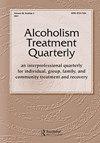Future Trends in Alcohol and Substance Use Disorder Research: Prevention, Treatment, and Recovery
IF 0.9
Q4 SUBSTANCE ABUSE
引用次数: 0
Abstract
Alcoholism Treatment Quarterly, 40–3 The third issue of Alcoholism Treatment Quarterly (ATQ),volume 40, features articles about the recent COVID pandemic and special populations in recovery. First, we are excited and honored to serve as Co-Editors-in-Chief and approach this work with a sense of responsibility rooted in passion, humility, and devotion. As alcohol and substance use researchers and clinicians, we believe editors have the opportunity to influence people, ideas, and outcomes across the entire spectrum of multiple industries. These impacts can span from directly influencing the lives of the many people who need help to informing legislative and regulatory efforts changes and outcomes. Our journal includes board members, authors, and readers from numerous professional specialty areas, and provides space for diverse theoretical and empirical approaches. Our primary responsibility is to ensure that our scholarship creates opportunities to enhance the science of our industries. This is especially true that we do it in a way that is relevant to the greatest number of people, organizations, and professions as possible. Our history at ATQ has been to highlight new and innovative approaches to treatment and recovery, describing clinical problems and solutions, and detailing practical, unique approaches to intervention, therapy, and recovery. Potential authors are encouraged to target and construct studies that include an experimental design when appropriate. We would like to feature articles that describe novel approaches to alcohol and substance-related research, practices, and topics that also include findings, thoughts, or recommendations across the continuum of care. There is still a shortage of recovery-focused research. In that vein, we also encourage authors to submit manuscripts that describe both shortand long-term outcomes. The role and impact of community, employment, family, and prevention are all topics of significant importance. An emerging trend in treatment and recovery perspectives regards interprofessional approaches, including both settings and practitioners. Authors are encouraged to explore this topic as it relates to expectancies, policy and management perspectives, treatment and research designs, and their related effect on patient, family, and community outcomes. Similarly, we also encourage authors to consider the role of new and emerging technologies such as mhealth, telemedicine, and telehealth, and to explore and employ a variety of methodological approaches, including quantitative, qualitative, or mixed-methods designs and approaches. Innovative and contemporary research will ensure that the scientific basis for our work is relevant and continues to evolve. When writing manuscripts for submission to ATQ, authors are encouraged to access and include past ATQ publications for supporting details and citations. We also recommend that researchers use the most current version of diagnostic tools, criteria, diagnoses when possible. ALCOHOLISM TREATMENT QUARTERLY 2022, VOL. 40, NO. 3, 277–279 https://doi.org/10.1080/07347324.2022.2080877酒精和药物使用障碍研究的未来趋势:预防、治疗和康复
《酒精治疗季刊》,40-3第三期《酒精治疗季刊》(ATQ),第40卷,刊登了关于最近新冠肺炎疫情和康复中的特殊人群的文章。首先,我们很高兴也很荣幸能担任联合主编,并以植根于激情、谦逊和奉献的责任感来处理这项工作。作为酒精和物质使用的研究人员和临床医生,我们相信编辑有机会影响多个行业的所有人、想法和结果。这些影响可以从直接影响许多需要帮助的人的生活,到为立法和监管工作的变化和结果提供信息。我们的期刊包括来自众多专业领域的董事会成员、作者和读者,并为各种理论和实证方法提供了空间。我们的首要责任是确保我们的奖学金创造机会来提高我们行业的科学水平。尤其是,我们以与尽可能多的人、组织和职业相关的方式来做这件事。我们在ATQ的历史一直是强调新的和创新的治疗和康复方法,描述临床问题和解决方案,并详细说明干预、治疗和康复的实用、独特的方法。鼓励潜在作者在适当的时候瞄准并构建包括实验设计在内的研究。我们想发表一些文章,描述酒精和物质相关研究的新方法、实践和主题,其中还包括整个护理过程中的发现、想法或建议。以恢复为重点的研究仍然不足。本着这种精神,我们还鼓励作者提交描述短期和长期结果的手稿。社区、就业、家庭和预防的作用和影响都是非常重要的主题。治疗和康复方面的一个新趋势是跨专业方法,包括环境和从业者。鼓励作者探索这个主题,因为它涉及预期、政策和管理视角、治疗和研究设计,以及它们对患者、家庭和社区结果的相关影响。同样,我们也鼓励作者考虑新兴技术的作用,如mhealth、远程医疗和远程医疗,并探索和采用各种方法论方法,包括定量、定性或混合方法设计和方法。创新和当代研究将确保我们工作的科学基础是相关的,并继续发展。在撰写提交给ATQ的手稿时,鼓励作者访问并包括过去的ATQ出版物,以获取支持细节和引文。我们还建议研究人员尽可能使用最新版本的诊断工具、标准和诊断。《2022年酒精中毒治疗季刊》,第40卷,第3期,277–279https://doi.org/10.1080/07347324.2022.2080877
本文章由计算机程序翻译,如有差异,请以英文原文为准。
求助全文
约1分钟内获得全文
求助全文
来源期刊

Alcoholism Treatment Quarterly
SUBSTANCE ABUSE-
CiteScore
1.60
自引率
11.10%
发文量
31
期刊介绍:
Alcoholism Treatment Quarterly is an exciting professional journal for clinicians working with persons who are alcoholic and their families. Designed to bridge the gap between research journals and information for the general public, it addresses the specific concerns of professional alcoholism counselors, social workers, psychologists, physicians, clergy, nurses, employee assistance professionals, and others who provide direct services to persons who are alcoholic. The journal features articles specifically related to the treatment of alcoholism, highlighting new and innovative approaches to care, describing clinical problems and solutions, and detailing practical, unique approaches to intervention and therapy.
 求助内容:
求助内容: 应助结果提醒方式:
应助结果提醒方式:


